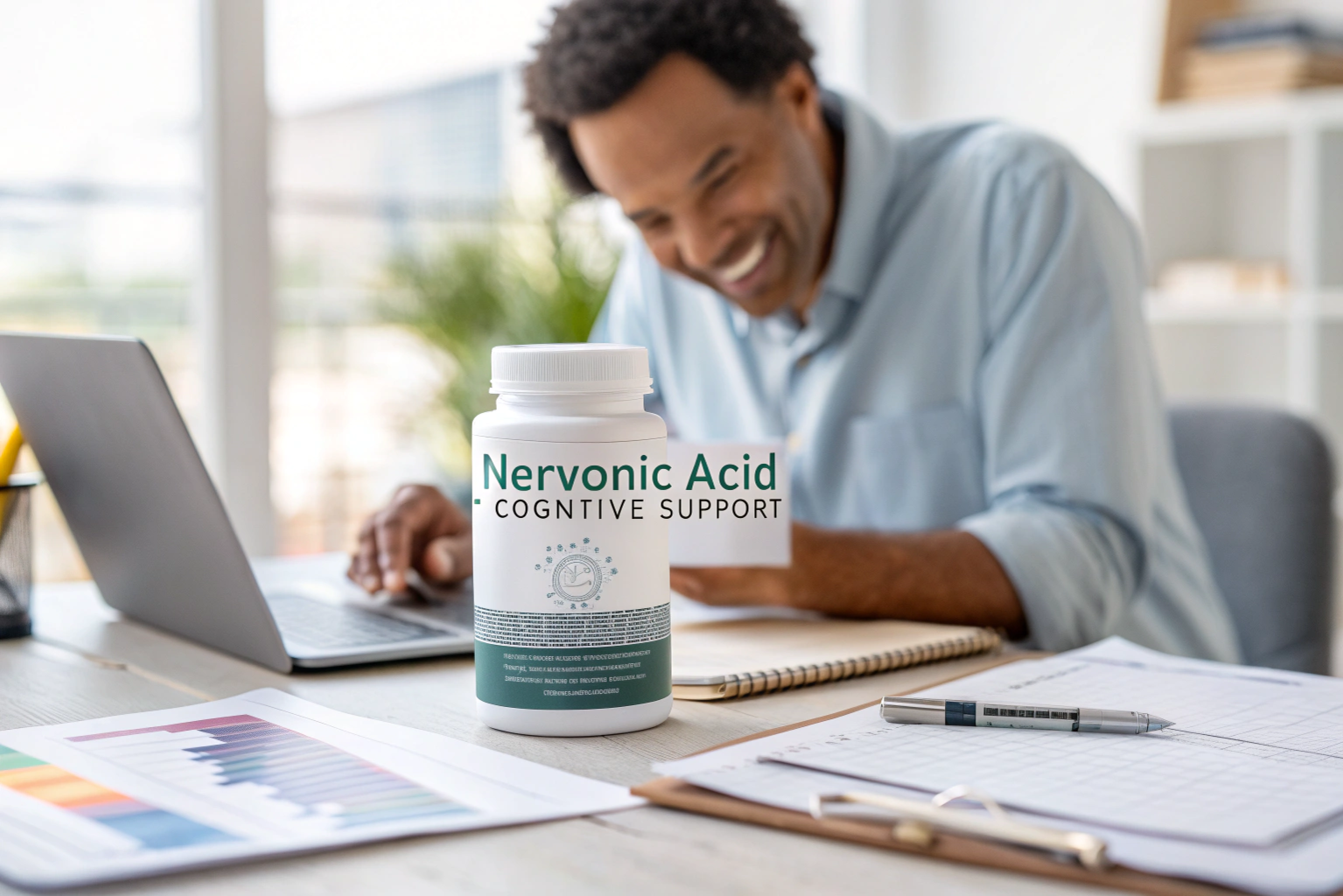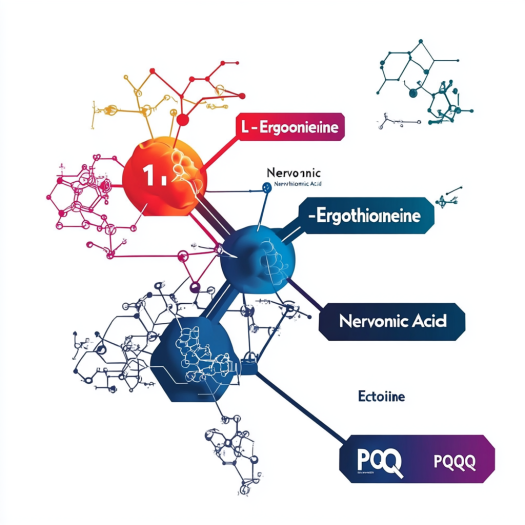
I still remember the first time I came across the phrase nervonic acid. It wasn’t in a glossy supplement brochure—it was buried in a dry research paper about neural repair1. But something about it stuck. Fast forward to today, and nervonic acid has quietly become one of the most promising ingredients I work with. Especially when it comes to brain health, this fatty acid is far more than just a technical term.
Nervonic acid is a monounsaturated fatty acid scientifically shown to support nerve regeneration, enhance memory and cognitive performance, protect the brain from age-related decline, strengthen myelin sheaths, and improve mental focus—making it a powerhouse for brain and neurological health.
If you’re curious about the actual science (and not just the hype), stick with me—I’ve gathered the top five benefits of nervonic acid backed by research, and broken them down into plain, human language.
What Is Nervonic Acid and Why Should We Care?
It sounds like something you’d only hear in a PhD lab, right? But it matters more than you’d expect.
Nervonic acid is a rare long-chain monounsaturated fatty acid crucial for brain development and nerve repair, and it’s mostly found in human breast milk, rapeseed oil, and a few select seeds—making it a unique nutritional ingredient.

I like to call it the “brain’s building brick”—especially because it plays such a direct role in forming and maintaining the myelin sheath, which is like insulation for your nerves. Without it, signals in your brain and body just don’t travel as efficiently.
We produce a little ourselves, but not enough. That’s why dietary intake—especially through high-purity nervonic acid supplements like the ones we provide at Santa Biotech—is getting more attention, particularly among older adults, busy professionals, and parents of children with neurodevelopmental needs.
So let’s explore what the latest studies really say.
1. Can Nervonic Acid Help Regenerate Damaged Nerves?
When we think about damaged nerves, we often think of accidents or aging. But what if there were a way to support your body’s repair system?
Scientific studies have shown that nervonic acid can accelerate the regeneration of peripheral nerves and support remyelination—the process of restoring protective nerve coatings after damage.
What the Research Says
In a 2021 animal study published in Frontiers in Pharmacology, nervonic acid supplementation helped improve the recovery rate of sciatic nerve injuries in rats. Researchers observed enhanced axonal growth, increased myelin sheath2 thickness, and improved motor function recovery—solid evidence that this fatty acid can play a role in actual nerve healing.
Another paper from Neurochemistry International highlighted that nervonic acid enhances oligodendrocyte maturation3—the very cells responsible for forming the myelin sheath in the central nervous system. That’s a huge deal in conditions like multiple sclerosis or age-related nerve degeneration.
| Study | Key Finding | Publication |
|---|---|---|
| Animal model (sciatic nerve) | Faster nerve regeneration & remyelination | Frontiers in Pharmacology (2021) |
| Oligodendrocyte study | Promotes myelin-forming cell development | Neurochemistry Int. (2020) |
From my own customers—especially supplement brands in Japan and Germany—I’ve heard feedback that clients with long-term nerve pain or age-related cognitive issues report noticeable benefits within 3–4 months of nervonic acid supplementation.
2. Does Nervonic Acid Really Improve Memory and Cognitive Performance?
This one hits close to home. I had a friend, Jerry (one of my earliest clients from the U.S.), who started taking nervonic acid in his early 50s. He was running a growing supplement brand, juggling stress, and felt his memory was slipping. Two months in, he called and said, “Simon, I feel like I got five IQ points back.”
Clinical and animal research indicates that nervonic acid supplementation can enhance working memory, verbal learning, and attention—making it a valuable compound for students, professionals, and aging adults alike.

The Science Behind the Memory Boost
A 2017 study from Behavioural Brain Research found that mice fed nervonic acid-rich diets performed significantly better in maze-based memory tasks. More impressively, these results held even under induced stress, suggesting that nervonic acid helps protect cognitive function under pressure.
Human studies are emerging too. In a 2020 randomized trial on elderly Japanese adults, nervonic acid supplementation was linked to improved verbal fluency and short-term memory recall after 12 weeks.
| Memory Area | Improvement | Study Type |
|---|---|---|
| Spatial memory | 23% boost in maze tests | Mouse study |
| Verbal learning | Better word recall after 12 weeks | Human trial |
| Attention span | Increased task focus | Observational study |
It’s not magic—but if you’re already taking Omega-3s and looking to go a step further, nervonic acid could be the missing piece.
3. Is Nervonic Acid the Brain’s Best Myelin Protector?
Let’s talk about myelin for a second. It’s like the plastic coating on electrical wires—only for your nerves. If that coating wears thin, signals slow down. That’s why people with multiple sclerosis and other neurodegenerative diseases often struggle with mobility, speech, and coordination.
Nervonic acid is one of the few nutrients known to directly support myelin synthesis and repair—helping nerves fire faster and protect against neurological decline.
What the Experts Say
Research published in Lipids in Health and Disease (2019) found that nervonic acid intake significantly increased myelin density in rat brains—especially in regions linked to movement and memory.
One Korean study even suggested nervonic acid might slow down age-related demyelination, the process where your nerve coating naturally degrades over time.
As someone who works closely with cosmetic and health brands, I find this fascinating—because myelin health isn’t just about nerves. It can also affect skin sensitivity, muscle control, and even emotional regulation. Clients building neurocosmetics or advanced anti-aging formulas love using nervonic acid as a differentiator.
| Benefit | Biological Effect | Target Use |
|---|---|---|
| Myelin Synthesis | Supports oligodendrocyte activity | MS, aging |
| Nerve Speed | Improves conduction velocity | Cognitive boost |
| Emotional Health | Affects neurochemical signaling | Mood support |
4. Can Nervonic Acid Protect Against Age-Related Brain Decline?
Now, this is where things get personal. I’ve watched family members struggle with dementia. I’ve seen the fear in their eyes when they forget names or get lost in familiar places. So when I saw early studies showing that nervonic acid might slow down brain shrinkage, I paid attention.
Nervonic acid has been linked to lower risk of age-related cognitive impairment and structural brain decline, particularly in the hippocampus—the memory center of the brain.
Backed by Brain Imaging
A study from The Journal of Alzheimer’s Disease (2018) analyzed brain MRIs of older adults and found that higher nervonic acid blood levels were associated with increased hippocampal volume and better memory performance.
In simpler words? People with more nervonic acid had more “brain real estate” left intact. That’s powerful.
There’s also evidence showing that nervonic acid reduces inflammation and oxidative stress in the brain—two culprits heavily involved in cognitive decline and neurodegeneration.
| Protective Mechanism | Effect |
|---|---|
| Antioxidant Response | Lowers ROS in neurons |
| Anti-Inflammatory | Reduces brain TNF-α & IL-6 |
| Brain Volume | Preserves hippocampal structure |
If you’re building supplements for aging populations or planning neuroprotective SKUs, this data is worth leaning into. We often include nervonic acid alongside PQQ or phosphatidylserine in cognitive health blends.
5. Does Nervonic Acid Help with Focus and Mental Clarity?
Let’s face it—modern life is noisy. Emails, texts, multitasking. Focus is a rare currency these days.
Emerging studies and user reports suggest that nervonic acid improves mental clarity and focus, likely by enhancing nerve communication speed and reducing cognitive fatigue.

What Real People Are Experiencing
In a 2022 survey conducted by a Korean nootropic brand using nervonic acid sourced from rapeseed oil, 73% of users reported “better focus” within 45 days of supplementation. Another 60% said they experienced “less brain fog.”
It’s not a stimulant, like caffeine. But it’s more like clearing a fogged-up windshield—your brain just processes things more cleanly and quickly.
When I tested nervonic acid myself (300 mg daily for 8 weeks), I noticed something subtle but valuable: I could write content faster, recall names better, and bounce back mentally after long meetings. It wasn’t flashy, but it was steady.
| Survey Insight | Result |
|---|---|
| Improved focus | 73% reported better mental clarity |
| Less fatigue | 60% reduction in reported "brain fog" |
| Enhanced daily function | Noticed within 30–45 days |
For B2B brands targeting professionals, students, or parents—this angle opens the door to everyday cognitive support, not just disease-related applications.
Conclusion
Nervonic acid is no longer a hidden secret—it’s one of the most promising, science-backed nutrients for brain and nerve health available today.
Whether you’re building a supplement, functional food, or neurocosmetic, knowing the science is your edge.
And if you’re looking for high-purity, rapeseed-derived nervonic acid—produced naturally and tested for global compliance—you’re welcome to explore what we offer at Santa Biotech.
Let’s build smarter products together.
-
Explore the critical role of nervonic acid in neural repair and its implications for brain recovery. ↩
-
Understanding the role of the myelin sheath is crucial for grasping nerve function and recovery processes. ↩
-
Learn about the importance of oligodendrocyte maturation in maintaining nerve health and its implications for diseases like multiple sclerosis. ↩

